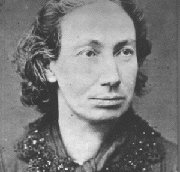May 29: The Red Virgin
Louise Michel (1830)
It was on this date, May 29, 1830, that the French anarchist and schoolteacher known as the Red Virgin, Louise Michel, was born in Vroncourt-la-Côte, France. Reared a Catholic by her mother and paternal grandparents, she developed keen observations about the suffering and social inequality around her, none of which the church attempted to alleviate. In 1853 she became a schoolteacher at Audelancourt, but aspired to fight the empire.
She observed the conditions of Paris in her poetry,
I have seen criminals and whores
And spoken with them.
Now I inquire
If you believe them made as now they are
To drag their rags in blood and mire
Preordained, an evil race?
You to whom all men are prey
Have made them what they are today.
When Franco-Prussian War ended in 1871, the worker-residents of Paris refused entry to their Prussian conquerors. The Paris Commune formed, with Louise Michel as one of its leaders. The Catholic Church, as the richest and most powerful French institution, had been hip-deep in Monarchist misrule, and so the Commune severed all state connection to the church, nationalized all church property, and secularized the schools.
But the Commune, assembled by 28 March 1871, fell by 28 May, amid a reactionary bloodbath: The Monarchists executed 30,000 and imprisoned 45,000, including 500 children; 30,000 were exiled. Michel was arrested for trying to overthrow the government. At her trial in 1873, she was defiant:
I do not wish to defend myself, I do not wish to be defended. I belong completely to the social responsibility for all my actions. I accept it completely and without reservations. ... I had no accomplices in this action. I acted on my own initiative. ... If you let me live, I shall never stop crying for revenge and I shall avenge my brothers. I have finished. If you are not cowards, kill me!
Instead, Michel was deported to New Caledonia, a hostile penal colony off the coast of Australia. Finally amnestied in 1880, Michel returned to France and to even more activity as an anarchist – a politics opposed to the authority of church and state. She became known as "la Vièrge Rouge," the Red Virgin, for her radicalism. As she said, "We revolutionaries aren't just chasing a scarlet flag. What we pursue is an awakening of liberty, old or new. ... Most especially it is the next revolution which is advancing under this dawn."
In her memoirs, Michel explained why she joined in battle at the barricades:
Was it sheer bravery that caused me to be so enchanted with the sight of ... our lines on night maneuvers ... red teeth of the machine guns flashing on the horizon? It wasn't bravery; I just thought it a beautiful sight. My eyes and my heart responded, as did my ears to the sound of the cannon. Oh, I'm a savage all right, I love the smell of gunpowder, grapeshot flying through the air, but above all I'm devoted to the Revolution.
She was arrested again and again, still fighting for social justice, and better wages and working conditions for labor. She was pardoned during her last prison stay so she could attend her dying mother. Louise Michel continued to lecture at home and abroad until her death in Marseilles on 9 January 1905. Her funeral drew two thousand mourners.
Originally published May 2003 by Ronald Bruce Meyer.


